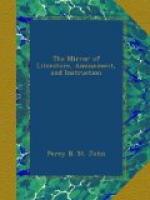Penelope has, however, one of the failings common to fashionable novels. Its plot is weak and meagre—but it is still simple and natural, and has not borrowed any of those adventitious aids to which we have alluded above. It bears throughout an air of probability, untinctured by romance, and has the strong impress of truth and fidelity to nature. Sketchy and vivacious, always humorous and sometimes witty; it has many scenes and portraits, which in terseness and energy, will compare with any of its predecessors; and occasionally there are touches of genuine sentiment which seize on the sympathies of the reader with more than common effect. The incidents of the narrative do not present many opportunities for these displays of the writer’s talent, and we cannot refrain from thinking that their more frequent introduction would have increased the success of the work—that is, if we may be allowed to judge from the specimens with which the author has here favoured us.
But we are getting somewhat too critical, and consequently as much out of our element as modern aeronauts, who are no sooner in the air than they seem to think of their descent. We shall not, however, impair the pleasure of the reader by giving him a foretaste of the whole plot of Penelope; but we shall rather confine ourselves to a few portrait-specimens of characters, whose drawing will, we hope, attract the general reader; presuming, as we do, that its claims to his attention will be found to outweigh dozens of the scandalous chronicles of high fashion. We are not told whether the parties ate with silver or steel forks, or burned wax or tallow; but those characters must be indeed poorly drawn which do not enable the reader to satisfy himself about such trifles, allowing that he thinks them worth his study.




